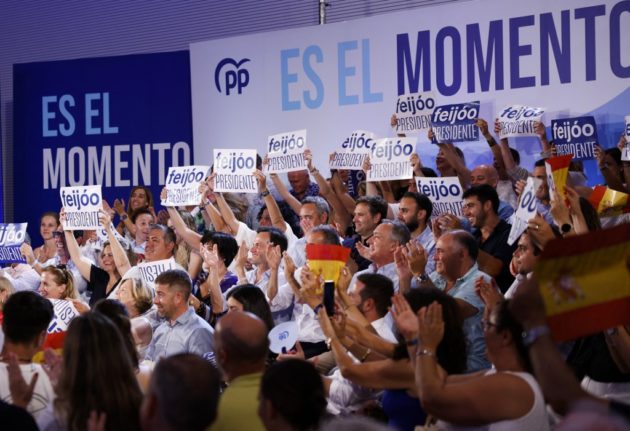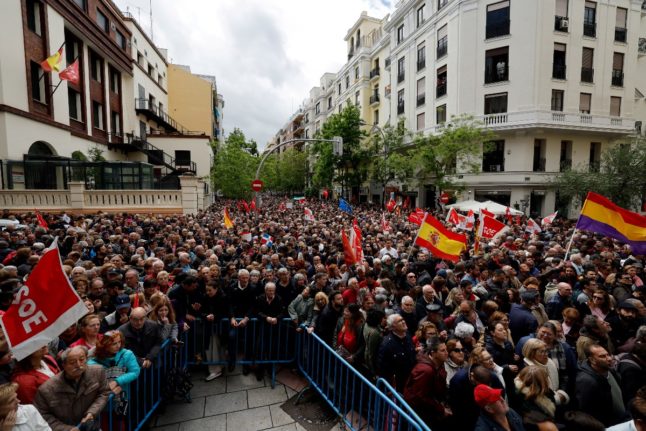Sunday 23rd is Spain’s pivotal general election. Called as a surprise snap poll by weakened Socialist (PSOE) Prime Minister Pedro Sánchez following a rough round of regional and local results in May, the vote has been framed as a now or never, progressive vs regressive vote.
READ ALSO: Spain’s likely new PM absent from crucial last debate before election
The polls suggest that Spain’s centre-right Popular Party (PP), led by Alberto Núñez Feijóo, will win the highest vote share. The unknown is whether the PP will come to rely on far-right Vox in order to gain an absolute majority and govern, though this seems the most likely outcome and is a scenario that could drag the PP further rightward on its pre-election pledges.
But much of the campaign so far has been based in culture war rhetoric, with PP and Vox attacking ‘Sanchismo’ and Sánchez’s alleged reliance on communist and separatist forces in Spanish politics.
READ ALSO: ‘Sanchismo’: PM’s personality cult or Spain’s progressive reformism?
As a result, we’ve heard little about what the party most likely to be in government, the PP, actually intend to do if they win power. So, what are Feijóo and the PP actually proposing?
Tax reform – The PP have pledged to carry out some pretty comprehensive tax system reform and the centre-right party will only be moving rates in one direction: down. In fact, Feijóo has explicitly promised “not to raise them.”
He has also pledged to lower rates of personal income tax on incomes of less than €40,000 to help cushion the impact of inflation. “I know that saying this at the moment is risky,” Feijóo has said, “but I have committed myself to it.” The party leader has also hinted that tax cuts would be a priority, and that it was specifically something he wanted to do “within the first 100 days of government”.
VAT cuts – in addition to the income tax cuts, PP have promised a reduction in VAT on meat, fish and preserves on a temporary basis.
Female unemployment – If the PP does get into government it has also pledged to design a plan to battle female unemployment that reduces the labour market participation gap holding women back.
Housing reform – the PP also proposes to repeal the housing law passed by the Sánchez government because it “has generated legal uncertainty and does not solve any of the underlying problems of the housing market.” Instead, it proposes a so-called ‘state pact’ on housing, working together with autonomous regions and local government to build affordable housing, implement a guarantee program aimed at young people up to 35 years old, promote social housing, and mobilise public land for house building.
READ ALSO: Five key points about Spain’s new housing law

Tourism – A PP government would approve a ‘PERTE’ (a strategic plan for economic recovery and transformation) for Spain’s all-important tourism sector and draw up a new tourism law.
Water – Feijóo has committed to developing a ‘National Water Pact’ and to promote a plan to modernise Spain’s dams and canals at a time of dwindling water reserves and drought.
Languages – The PP has also promised that ‘linguistic balance’ will be guaranteed in bilingual regions by ensuring that all students are able write and express themselves correctly in Spanish and in the corresponding co-official language. This in particular may be a policy area affected by a coalition with far-right Vox, a centralist party who wants to take powers away from the regions.
Health and social care – The PP’s pre-election pledges have also promised to create one unified social and healthcare card, and introduce a shared electronic medical record.
Gender violence – The PP has pledged to support Spanish courts in order to crackdown on violence against women and be competent in judging crimes of ‘sexist violence’. It remains unclear what exactly this will entail, and is particularly prescient as PP at the regional level has entered into regional government coalition with Vox members who deny gender violence exists and have even served time in prison for harassing their ex-wife.
Trans Law – Feijóo has promised to repeal the Trans Law, a flagship policy of Podemos, the junior coalition partner in the Sánchez government, and to draft a new one while fighting against all types of discrimination. In the past, the party leader has argued that it makes it “much easier to change sex than to get a driver’s licence”.
READ ALSO: IN DEPTH: What is Spain’s ‘Trans Law’ and why is it controversial?
Criminal code – Spain’s criminal code also seems set to be reformed, notably to standardise Spanish law with European legislation on sedition, embezzlement and illegal referendums, something that will likely play a key role in any PP government’s relationship with Catalonia. Again, this could prove to be a policy area key to any potential PP-Vox government.
Democratic Memory – The PP in government would also repeal the controversial Democratic Memory legislation passed by the Sánchez government, preferring a return to the previous 2007 memory law passed by the Zapatero government. The Spanish right has long been opposed to any kind of historical memory legislation, claiming that it digs up old rivalries and causes political tension. If the PP is forced into coalition with Vox, this is even more likely.
Points-based migration – Feijóo’s party has proposed a meritocratic ‘points-based system’ for immigrants such as those in the UK and Australia.
Squatting – A big campaign theme for the PP has been the issue of ‘Okupas‘. Feijóo has already hinted at a package of anti-squatting measures to allow fast-tracked evictions within a maximum period of 24 hours and increase the penalties for those convicted of occupying properties.
Small businesses – The PP would also look to reform how the financing of small and medium-sized businesses works by allowing access to alternative sources of financing beyond the banking system.



 Please whitelist us to continue reading.
Please whitelist us to continue reading.
Member comments